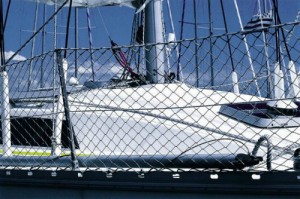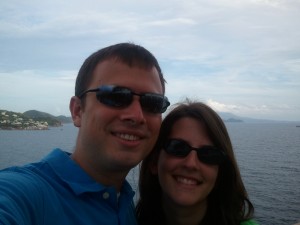Whenever we are dealing with finances Dan and I like to plan for a pretty decent margin of error. (Dan would appreciate it if I would practice this a little more in dealing with scheduling as well; I am consistently 5 minutes late.) If you could listen in to some of our mini-planning sessions we frequently have, you would hear the phrase “worst case scenario” at the beginning of most of them. We figure that if we plan for the worst case – within reason of course, we aren’t going doomsday here- then we will be left with a much higher comfort level and safety net in times when we’re living on the other end of the spectrum.
The margin of error is especially important when we are talking about making a budget for a lifestyle that we have never lived before. Sure we think that we will be fine living on $1000-$1500 per month based on our research, but that’s all it is right now, research. It’s crucial for us to know that if that doesn’t end up being true we aren’t left high and dry (pun intended). The whole basis of this adventure is our desire for freedom but you can’t have freedom if you are constantly worried about how you are going to pay for the next time your engine needs a tune-up.
There are a couple of big ways that we are dealing with the margin. The first is in how we are planning out our rental income. Dan has created a spreadsheet that we use to evaluate any potential rental properties that we look at which takes into account all expenses (including property management costs at the highest rate we’ve seen in our area) and also vacancy rates of our tenants. We have separate columns for vacancy rates at 0%, 4%, 7%, and 11%. The current accepted vacancy rate in our area is a very low 2-3% but we use the 7% rate as the amount that we use for budgeting purposes. We hope this will give us a very safe expectation of income from our rentals even if the market worsens a bit before we leave. Hopefully we’ll continue filling vacancies within a week or two as we have done with our first 2 houses and also find a manager we like at a lower price, but if we don’t we are still fairly comfortable.
The second part of the plan is maximizing our income earning potential while cruising. Dan is currently a certified PADI Dive Master and plans to become a PADI Open Water and Specialty Instructor as soon as possible. Because PADI is recognized worldwide we are hoping that this will give us a nice back-up option if our income falls short of expenses. We also intend to log our sailing time once we start cruising to begin the process of getting Coast Guard Captain’s licenses (6-pack at least) which would allow us to complete deliveries and also increase Dan’s marketability as a SCUBA instructor who is licensed to carry divers himself. Finally, investment income on other savings and maybe some future swing trading as described in Live on the Margin in addition to some small income from this blog (yes we have recently added ads to the site) eventually could all add to a few hundred a month for extra flexibility.
Best Case Scenario: our costs will not overextend our rental income, we will have renters who stay for years at a time and financial stress will be a thing of the past in our new life. Worst Case Scenario: we have crappy renters who tear up our houses, our boat breaks down too often and Dan has to take up part-time work doing his favorite hobby. Sounds like a pretty nice life either way.



 We are normal (well ok, not so normal) people that have a dream to see the world and live life as it was meant to be. We both have successful careers in the healthcare industry, even in this terrible economy. We want to break free of the current cycle of trading time for dollars and dollars for more and more things we don't need. So, we have decided to forego the fruits of our economic success and "retire" well before we are 30 and set out to see what is over the Horizon.
We are normal (well ok, not so normal) people that have a dream to see the world and live life as it was meant to be. We both have successful careers in the healthcare industry, even in this terrible economy. We want to break free of the current cycle of trading time for dollars and dollars for more and more things we don't need. So, we have decided to forego the fruits of our economic success and "retire" well before we are 30 and set out to see what is over the Horizon.